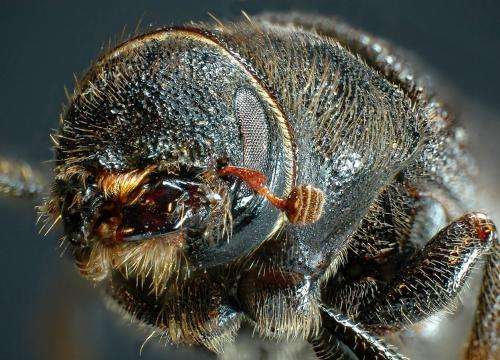Pining for a beetle genome

The sequencing and assembly of the genome of the mountain pine beetle, Dendroctonus ponderosae, is published online this week in Genome Biology. The species is native to North America, where it is currently wreaking havoc in an area of forest ten times larger than previous outbreaks. This paper determines genes that may be involved in colonizing the trees, such as enzymes for degrading plant cell walls, and identifies potential sex chromosomes in the beetle.
D. ponderosae is a species of bark beetle, native to North America, that attacks various species of pine trees. The beetle releases pheromones that attract more beetles to a tree, and this mass-attack of the tree in combination with a fungus spread by the beetles kills the tree. It then lays its eggs and the larvae feed under the bark.
Beetles are the largest insect order on our planet, with over 400,000 species known. Until now, only one, the red flour beetle, had been sequenced. Joerg Bohlmann and colleagues sequenced D. ponderosae, in order to better understand the unique aspects of this beetle's biology. As well as genes involved in the colonizing of trees, the team identifies a bacterial gene that has seemingly been transferred into the beetle genome. Their description of potential sex chromosomes in the beetle could have important implications for investigating sex-specific differences in the species, such as pheromone production and size dimorphism, and how the sex-specific differences in this and other beetle species originated.
The current outbreak has destroyed more than 15 million hectares of pine forests with major environmental impacts on forest health, and economic impacts on the forest industry. The team believe that the knowledge of the genes involved in the breakdown of host defense compounds, and the production of pheromones that draw others to the tree could help with the development of better control methods for this most serious of pests.
More information: Draft genome of the mountain pine beetle, Dendroctonus ponderosae Hopkins, a major forest pest Christopher I Keeling, Macaire MS Yuen, Nancy Y Liao, T Roderick Docking, Simon K Chan, Greg A Taylor, Diana L Palmquist, Shaun D Jackman, Anh Nguyen, Maria Li, Hannah Henderson, Jasmine K Janes, Yongjun Zhao, Pawan Pandoh, Richard Moore, Felix AH Sperling, Dezene PW Huber, Inanc Birol, Stephen JM Jones and Joerg Bohlmann, Genome Biology (in Press)
Journal information: Genome Biology
Provided by BioMed Central














